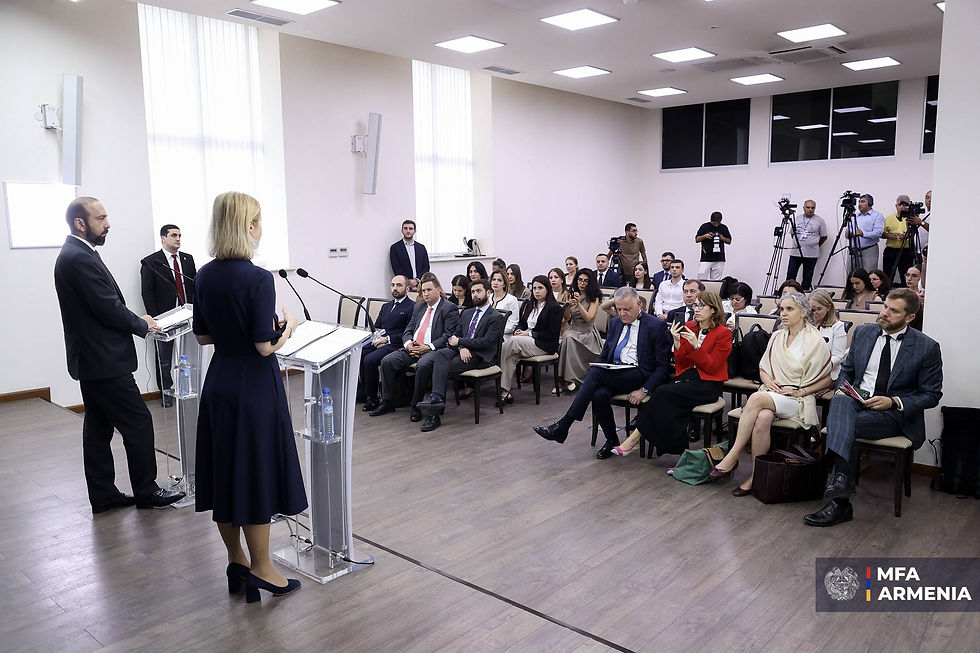EU’s Top Diplomat Arrives in Yerevan with a Bold Message: Europe Stands with Armenia
- Jun 30, 2025
- 3 min read

The relationship between Armenia and the European Union reached a new level this week as Kaja Kallas, Vice-President of the European Commission and the EU’s top foreign affairs official, visited Yerevan with a strong and supportive message. Her visit shows the growing ties between Armenia and Europe as the country seeks deeper partnerships and greater stability during regional tensions.
Kallas made it clear: the European Union has never been so close to Armenia. Her visit to the capital was filled with meetings, agreements, and promises of cooperation. She praised the reforms Armenia has implemented in recent years and expressed readiness to continue supporting the country through financial assistance and political support.

One of the most important parts of this partnership is a new business assistance package worth 270 million euros for the years 2024 to 2027. This is in addition to social support aimed at helping people who have been displaced, though no details were given on where these people were from or why they had to flee.
During her visit, Kallas also spoke about building stronger connections between ordinary citizens of Armenia and the EU. She emphasized the ongoing dialogue about visa liberalization — a process that could eventually allow Armenians to travel more freely to EU countries. This kind of people-to-people contact is seen as a foundation for stronger long-term ties.

Kallas also visited the EU’s civilian monitoring mission in Armenia, which plays an important role in maintaining peace and stability in the region. She stressed the significance of this mission and said she was impressed by its work. Additionally, a new agreement was signed that allows Armenia to take part in EU crisis management missions around the world, showing trust and expanding cooperation beyond Armenia’s borders.
Kallas said that promoting democracy in Armenia remains one of the EU’s top priorities. She also said that peace between Armenia and Azerbaijan is important for the broader stability of the region. According to her, a peace deal is needed not only for Armenia and Azerbaijan, but also for improving ties between Europe and Central Asia.

The EU believes that any settlement must respect sovereignty, territorial integrity, and recognized borders. These are seen as essential principles for peace and are non-negotiable. Kallas confirmed that she also made this point during her recent visit to Baku, the capital of Azerbaijan.
However, while the EU shows support for Armenia, there are some internal roadblocks within the union itself. Kallas indirectly confirmed reports that Hungary is blocking additional funding for Armenia through the European Peace Facility. She explained that decisions in the EU must be made by consensus, and not every country agrees. Still, she said they are working on finding a solution.
During Kallas’s visit, the Armenian government and the EU held special consultations on security and defense. These meetings were described as a turning point in their relationship.
Armenian Foreign Minister Ararat Mirzoyan listed three major achievements:
Crisis Participation Agreement: Armenia signed a deal to take part in EU missions in global crisis areas. This shows mutual trust and a desire to work together beyond the region.
Security and Defense Talks: These new consultations are meant to help Armenia meet today’s challenges, such as hybrid threats and foreign disinformation campaigns. The presence of the EU’s civilian mission in Armenia, backed by the European Peace Facility, was recognized as a key part of this effort.
New Armenia-EU Partnership Agenda: Armenia and the EU finalized an ambitious new roadmap for cooperation. It adds new areas of collaboration and deepens existing ones. Mirzoyan said this document proves just how close Armenia-EU relations have become.
Mirzoyan also mentioned that Armenia’s parliament recently passed a law to begin the country’s journey toward EU membership. This is a big step, signaling Armenia’s long-term goal of joining the European community.

Other topics discussed during the visit included possible progress on visa-free travel, stronger trade connections, and the coordination of infrastructure projects. One such project, called the “Crossroads of Peace,” is part of Armenia’s vision to serve as a key transit route between Europe and Central Asia. The EU’s “Global Gateway” and the “Middle Corridor” initiative were also discussed as complementary strategies for regional development.
There is also anticipation building for next year, as Yerevan is set to host the next summit of the European Political Community — a major event that will bring many European leaders to Armenia and highlight the country’s growing role in regional diplomacy.
—
Support independent reporting from the region by subscribing to The Armenian Report. Our team is funded solely by readers like you.






Comments